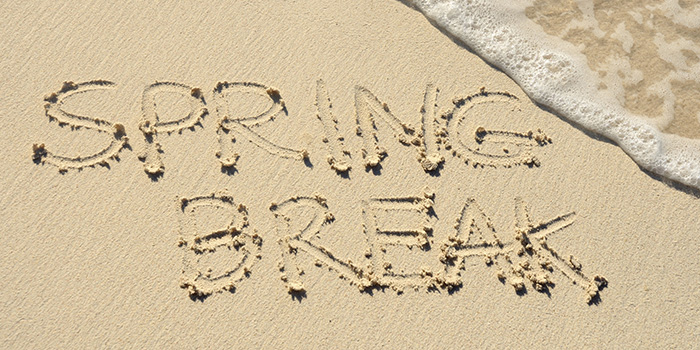“Work hard, play hard!” is often a saying heard on college campuses, especially during the period leading up to the spring break holiday. For college students across the nation, the spring break tradition promises hard-earned fun and relaxation away from the stressful demands of school. Most students use this time to relax and recharge for the rest of the spring semester.
However, for some students the “work hard, play hard” slogan can also represent a time of high-risk behavior. As students anticipate the mid-semester break, now is the time for you to speak openly and honestly with your students about the facts surrounding high-risk behavior. With raised awareness and increased knowledge, your student has the power to prevent serious and harmful repercussions. Utilize the tips for families below to help prevent high-risk behavior during the spring break holiday:
- Start the conversation: Having a discussion around sensitive topics can be difficult. Approach your student – show him or her that you are supportive and can be trusted. Students are most receptive when families use a non-judgmental tone and ask questions that encourage reflection on his or her choices (e.g. the question “What’s your plan for getting to and from your destinations?” may be more effective than the statement “Make sure you have a designated driver.”) Bring up some of the risks your student may encounter while on his or her trip and ways to be safe.
- Make a plan together: Your student may feel they will need your assistance over spring break and it is important to discuss what those situations may be. For example, set up an emergency plan. Exchange contact information of people, resources and locations where your student will be visiting so there is no problem contacting each other. Discuss the open line of communication between you and your student and consider a schedule of calls and texts while your student is on break.
- Explore WAVES as a resource: Wellness, Alcohol and Violence Education and Services staff is available to consult with any member of the Mason community about alcohol or drugs issues, sexual health, nutrition, stress management, or interpersonal violence issues such as stalking, intimate partner violence or sexual assault. To find out more about WAVES and if it is the right resource for your student, visit waves.gmu.edu. Each year, WAVES hosts Safe Spring Break Awareness Week, a variety programs with different campus offices the week before spring break. We focus on giving students the tools to make the most of their well-deserved break by relaxing in a safe and healthy manner. Recommend the week to your students and find out more on our website!
When discussing a safe spring break with your student, consider the tips below in order to encourage choices that will keep him or her healthy and ensure a fun and safe time:
- Travel safety: Encourage your student to research the laws and environment of the spring break destination. Also, remember it’s not all about the destination, suggest using caution on the transportation to and from destinations.
- Alcohol safety: There are many ways to be safe around alcohol. Talk with your student about not drinking too much, slowing down, eating something, avoiding drinking games, and having a designated non-drinker.
- Sexual health safety: Discuss the benefits and risks involved with sexual activity. Know the facts about forms of protection and sexually transmitted infections. Help your student decide what types of birth control or options are right for him or her.
- Relationship safety: During this break many are traveling or meeting up with groups of friends and partners. Assist your student in understanding consent, effective communication, and boundaries.
Spring breakers need not place themselves at risk to have fun. Making smart choices can go a long way toward enjoying a well deserved get-away with friends while simultaneously being safe. For additional information, contact Mason’s Wellness, Alcohol and Violence Education and Services Office.
Mary Ann Sprouse, Director
Kathryn Walker, Coordinator for Alcohol, Tobacco and Other Drug Education
WAVES – Wellness, Alcohol and Violence Education and Services

